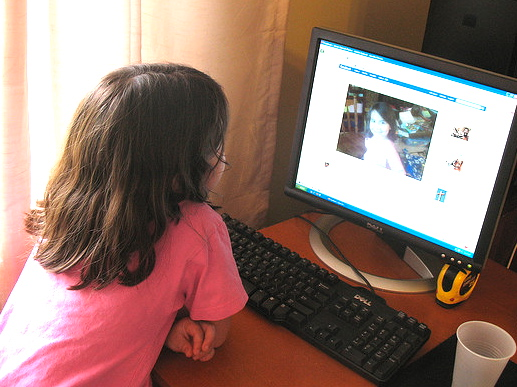Telling your nine-year-old that she isn’t
old enough to use social networking sites such as Twitter or Facebook simply
doesn’t work (even though the official minimum age or Facebook is 13).
After all, she argues, her friends use
these sites, and she would feel left out and excluded if she couldn’t take
part. You don’t want her to be isolated in the virtual world – which might also
lead to her social isolation in the real world – yet you are concerned about
how to keep her safe, healthy and secure when she uses such websites.

Telling your nine-year-old that she isn’t old enough
to use social networking sites
If you have decided to allow her to sign
up, here are some suggestions to help her find the experience rewarding, safe
and fun:
Privacy, not secrecy: Tell her that you would like to know about everyone she
communicates with. Set this as one of the key ground rules: She must not have
secret contacts with others you don’t know about. Of course, she’s entitled to
privacy, but that’s difference from secrecy. And explain that you want o have
regular looks at her account.
Behave yourself: Explain to her that everything she posts while online is
potentially public and visible to lots of other people. That’s why she should
clearly understand that she should clearly understand that she should post
nothing – even to her friends – she wouldn’t say to that person face to face.
Children can easily become immersed in the virtual world, so emphasize the
importance of behaving towards others in the same way as she would in the real
world.
Real friends only: People can assume false identities when online, and can pretend to
be anyone they want. Your child should understand that when she’s on one of
these social networks, she should get in touch only with children whom she
knows personally, no matter how interesting and exciting that person may sound.

People
can assume false identities when online, and can pretend to be anyone they
want.
Don’t tell:
Another important rule is that y nine-year-old should never give out any
personal details that could identify her. Such information includes her full
name, date of birth, address, telephone number, school or names of her family
members. Explain that there’s no need to share such information with children
or other people she’s familiar with and those she doesn’t know personally
shouldn’t have these details.
No chat rooms: Make it clear that she should not stray into chat rooms of any
sort, no matter what her friends say. A chat room is simply a private forum
that is open only to specific people. As such, it’s usually the preferred
mechanism for an adult with malevolent intentions to meet children by
pretending he or she is a kid.

Make
it clear that she should not stray into chat rooms of any sort, no matter what
her friends say.
Set time limits: It’s easy to chalk up the hours spent on such sites, so set
reasonable time limits – for example, a maximum of 15 minutes a day during the
school week and 30 minutes a day during the weekend. Ensure that she sticks to
them.